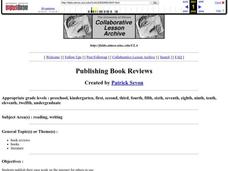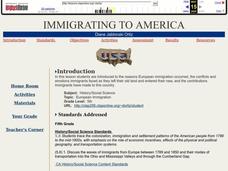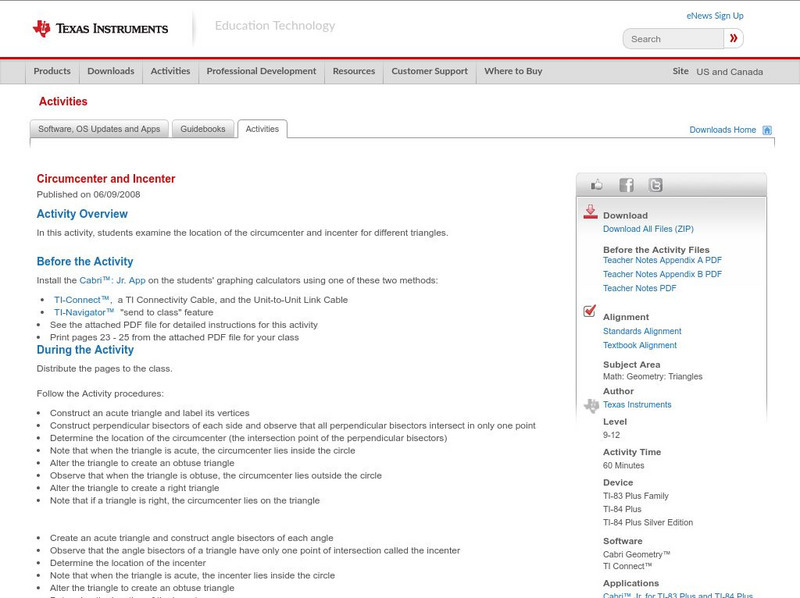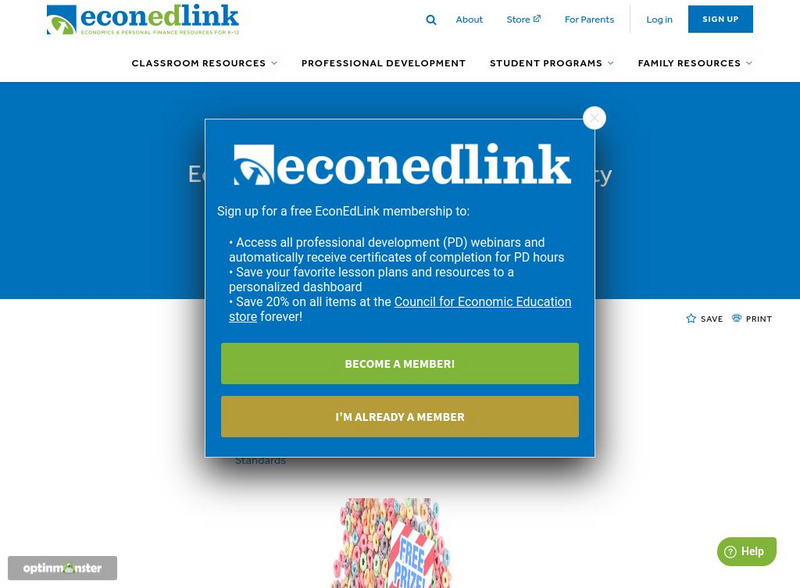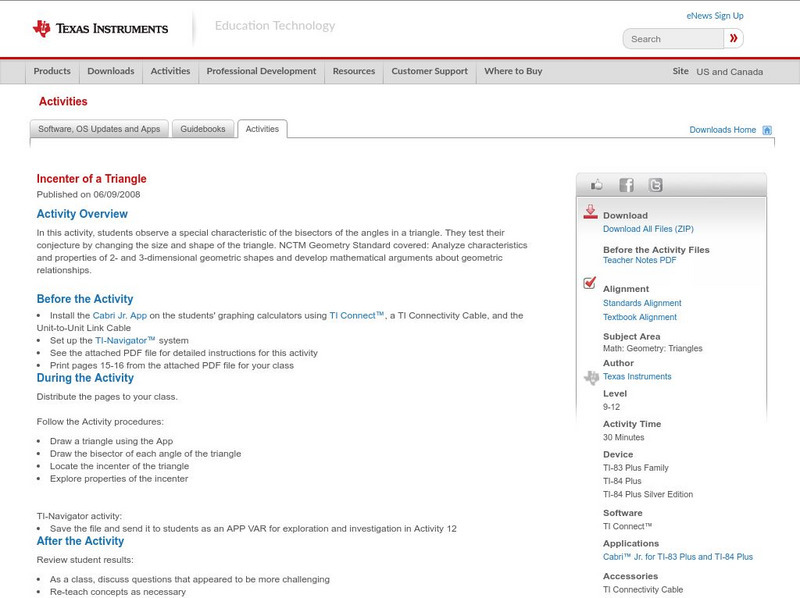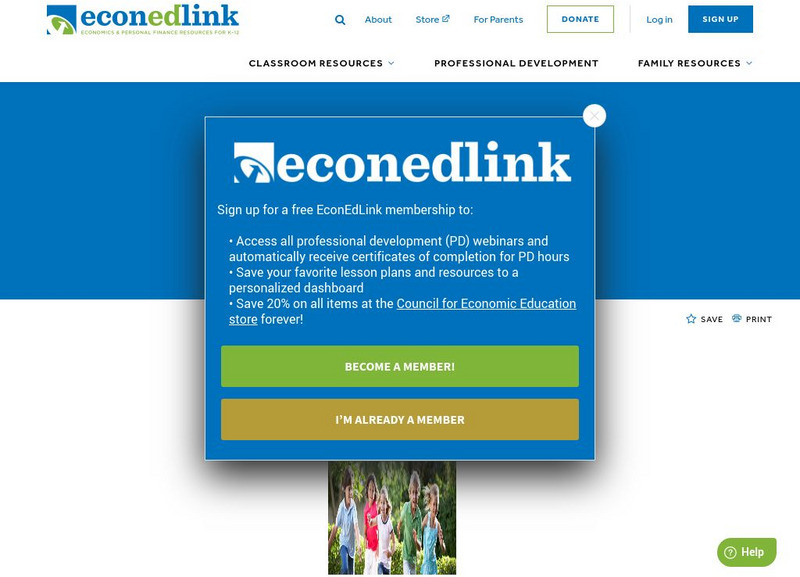Curated OER
Put A Scientific Spin on Teen Read Week!
Celebrate Teen Read Week by incorporating literature into your science curriculum.
Curated OER
Markets in Action
Have your class apply concepts from lectures and use from simple examples to discuss more complex problems that have been reported in the news. This is a lecture driven lesson with a lot of interesting information.
Curated OER
Publishing Book Reviews
After reading "How to write a good book review" and browsing some book reviews, class members generate a list of things they would like to see in a book review. Then young reporters read a book, write a review and post their polished...
Curated OER
Overland Trails To The West
Consider the political, physical, and geographical factors that led to and marked the Westward Expansion. Learners will track the various routes developed during the 1800's. They create a first person journal describing what they see,...
Curated OER
Immigrating to America
Coming to America as an immigrant can be an emotional and difficult process. This lesson has learners explore what it means to be an immigrant, listen to real life accounts, and visit an online museum. This is a wonderful discussion...
Perkins School for the Blind
Rough or Soft?
When a child has some vision they need to be encouraged to use it in a positive and stimulating way. To better understand which types of tactile reinforcers your learner likes best; you'll rub different textured objects on his/her arm...
Curated OER
Get Everyone Reading and Talking About Books
You can promote the love of reading with creative projects.
Curated OER
Money, Commercial Banking, and Interest
Stdents explore the operation of the commercial banking system and the mechanics of money creation through the lending process. They investigate various interest rates to develop the relationship between interest rates and risk and...
PBS
Financial Crisis Glossary
Secondary learners explore the background and vocabulary surrounding US and global economic crises. Originally, the lesson was written to address the 2008 economy, but the material and information is easily adaptable to today's economy....
Council for Economic Education
Econ Ed Link: Classroom Cash Incentive Plan
Learn more about the economy through this informative lesson. "In this lesson, you will learn how the incentive program affects the personal choices you make in class. You will also analyze how economic incentives can affect behavior."
Texas Instruments
Texas Instruments: Circumcenter and Incenter
In this activity, students examine the location of the circumcenter and incenter for different triangles.
Council for Economic Education
Econ Ed Link: What Are Incentives?
Young scholars will understand that incentives are used to encourage them to make good choices. After identifying incentives offered at home and in school, the students will distinguish between positive and negative incentives.
Council for Economic Education
Econ Ed Link: Classroom Cash Incentive Plan
Students will be rewarded for positive behavior and performance in class through a monetary incentive program. Classroom cash will be earned on a daily basis for such things as attendance, punctuality, and assignment completion....
Council for Economic Education
Econ Ed Link: Economic Incentives in Our Community
Students will identify positive and negative economic incentives used in their communities to encourage people to make CHOICES beneficial to the community. Students will recognize that not all incentives convince all people since people...
Council for Economic Education
Econ Ed Link: Be All You Can Be for Minimum Wage? (Student Page)
This lesson ask students to calculate the percentage change in military strength over the last two decades, hypothesize economic (and non-economic) explanations for these changes, test hypothetical explanations by reading an economic...
Texas Instruments
Texas Instruments: Incenter of a Triangle
In this activity, students observe a special characteristic of the bisectors of the angles in a triangle. They test their conjecture by changing the size and shape of the triangle.
Council for Economic Education
Econ Ed Link: Keep the Strike Going? Or End It? That Was the Question
In this lesson students will be able to describe the circumstances around the 1998 NBA players strike, list the incentives that influenced player and owner decisions, and identify the costs and benefits the strike had on various groups.
Council for Economic Education
Econ Ed Link: Rationalizing Transplants
This lesson encourages students to explain the consequences of a non-market rationing process, to evaluate the consequences of restricting organ transplants to U.S. citizens, and to suggest alternative policies to reduce the scarcity of...
iCivics
I Civics: The Market Economy
This lesson teaches the basics about the market economy, including the relationships between consumers and producers, supply and demand, and profit and incentive. Students learn six traits of a market economy, compare the market economy...
Other
Foundation for Teaching Economics: Homepage
The Foundation for Teaching Economics is committed to excellence in economic education. The Foundation offers free workshops for high school educators and students. This site includes workshop dates, locations, and registration...
Council for Economic Education
Econ Ed Link: The 411 on College Education
What are the costs and benefits to getting a college degree? Use this lesson plan to get your students thinking about the options they have for higher education and how to pay for it.
Council for Economic Education
Econ Ed Link: The Mystery of Is It Mine or Ours?
Students will learn that people respond predictably to positive incentives (rewards) and negative incentives (penalties). They will identify incentives in their daily lives at home and school. Students will discuss which incentives have...
Council for Economic Education
Econ Ed Link: Why Cities Provide Tax Breaks
Like the state and federal government, local governments offer tax incentives to businesses to help solve economic and/or environmental problems. In this lesson, students will explore three different cities and determine what incentives...
Council for Economic Education
Econ Ed Link: Tricks for Treats
Students will recognize that people (and animals) will work for incentives.




